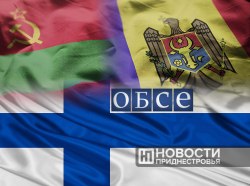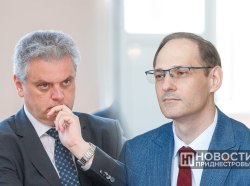Tiraspol, 4 July. /Novosti Pridnestrovya/. The deputy chairman of the Russian government, presidential envoy on Pridnestrovie, Dmitry Rogozin, arrives in Pridnestrovie tomorrow. He is expected to meet Pridnestrovian President Yevgeny Shevchuk, Chairman of the Government Pavel Prokudin, Chairman of the Supreme Council Vadim Krasnoselsky. Along with Tiraspol, the Russian politician, who is also a co-chair of the Moldo-Russian intergovernmental commission on trade and economic cooperation, will visit Kishinev. There he will meet Moldova's Prime Minister Pavel Filip, Vice Prime Minister Octavian Calmîc as well as Moldova's chief negotiator with Pridnestrovie, Vice Prime Minister Gheorghe Bălan.
Moldova's leaders are expecting they will manage to agree with Rogozin about a «road map» to normalise trade relations between the two countries, including the abolishment of Russia's embargo on the importation of Moldovan agricultural products and alcohol. Taking into consideration that Dmitry Rogozin will hold a meeting with Gheorghe Bălan, Pridnestrovie hopes that the Russian deputy prime minister will be able to reduce pressure on the PMR.
«First of all, this refers to our citizens' free movement. Because this blockade imposed by Ukraine and Moldova does not only hinder the movement of our country's public officials or leaders, but also hinders business and ordinary people," said the ataman of the Black Sea Cossack Host, Igor Nebeigolova.
It is quite possible that the issues form the agenda of the Moldo-Pridnestrovian negotiations, including the removal of deliberate restrictions and barriers imposed by Kishinev on Pridnestrovie's economic entities may be linked with the lifting of the embargo. Taking account of Russia's interest in securing stability in the Black Sea region, it may also be the case that Rogozin will talk with Kishinev about the provision of additional guarantees of retaining the current peacekeeping mission on the Dniester, removing obstacles for the rotation of Russian servicemen and normal logistical support for the operation.
For several years Moldovan politicians have been talking at various levels about the necessity of modifying the peacekeeping operation, securing the safety of Pridnestrovian residents, with about 200,000 Russain citizens among them, into a civilian mission. But Pridnestrovie remembers that once a OSCE civilian mission failed to prevent bloodshed here and, therefore, is sceptical towards such «proposals».
The issue of guarantees, and first of all guarantees of complying with the previous agreements, has recently been raised, among other things, by the Russian side. The participants of the «Permanent conference on political issues…» (5+2 format) received Russia's proposals about intensifying the negotiations, including by enhancing the mechanism of implementing agreements reached in the process of negotiations. The necessity of working out such a mechanism was later stipulated in a protocol signed on the results of Berlin's 5+2 talks.
As of today, Moldova has officially withdrawn from only one agreement with Pridnestrovie, with over a dozen more ignored by the Moldovan authorities de facto.
If Rogozin manages to come to agreement with Kishinev on this or other issues of concern for Pridnestrovie, these agreements may be signed at the next «Permanent conference…» meeting or during the Bavarian conference on confidence building, which takes place later this month. This is why, the efficiency and substantiality of negotiations depend to a certain extent on the results of the Russian vice premier's visit.
In addition, according to Svetlana Osipova, an assistant professor at the department of social studies of Shevchenko Pridnestrovian State University, it would be useful to add a regular character to Rogozin's visits to Pridnestrovie. Moreover, Russia, which has succeeded so far in mediating the settlement of the Moldo-Pridnestrovian conflict, will probably have to mediate a domestic political crisis unfolded in Pridnestrovie amid worsened economic situation and shortage of foreign currency.
At least, this is what Pridnestrovians, including civil activists, are expecting of Russia as a whole and Dmitry Rogozin in particular. «His [Rogozin's] task is likely to consist in looking at the problem from within and consolidate all branches of power to resolve it," said the chairman of the Union of the Moldavians of Pridnestrovie, Valerian Tulgara. According to the public activist, the orientation toward Russia may not be the only common denominator in seeking a compromise among various political groups — Russia may also propose specific mechanisms of resolving urgent economic issues, including the foreign exchange crisis.
«Russia saw even more difficult stages in its history as it concerns the stabilisation of its forex market and national currency's rate," noted Valerian Tulgara.
Representatives of the PRB, Pridnestrovie's executive and legislative branches of power have been invited to Moscow for holding consultations with Russian economists on the sore foreign currency problem.
However, as Svetlana Osipova underscores, the elaboration of a consolidated solution to this and other acute issues ultimately depends on the willingness of various branches of power in the PMR, representatives of various political groups to find this consolidated solution. «There must be inner willingness to compromise, and if this willingness does exist, the role of the mediator is important. It is important in the way that the mediator may voice the positions of the sides, which they cannot do on their own due to a confrontation between them. He may propose a negotiation platform where the sides may meet and, finally, say 'break' if something goes wrong," she said in an interview with journalists.
In the event a compromise between Pridnestrovie's branches of power fails to be found even through the mediation of the Russian president's special envoy, the political crisis may be settled, at least partially, in an indirect way, though it will take significantly longer. This refers to the removal of the reasons that have caused the crisis, in other words, to combating Pridnestrovie's recession, securing steady economic growth, levelling out the currency balance. According to Valerian Tulgara, the inclusion of Pridnestrovian enterprises into the list of Russian enterprises receiving government and defence orders would contribute to the amelioration of the country's economy, which may also be on the agenda of Rogozin's visit.
It should be noted, however, that the development of the country's economy is coupledas a rule with stability in other spheres, first of all political, and even if Russia will propose certain measures aimed at getting Pridnestrovie out of the recession, they will be more successful in case the political class gets consolidated.
In addition to the economic issues, according to public activists, there are a number of other problems which Pridnestrovie's leadership should discuss with Russia's presidential envoy. «It would be desirable to solve in some way the issue of granting the Russian citizenship to people who were born in Pridnestrovie after 1992. We have plenty of such young men who, unfortunately, do not account for any programme of acquiring the Russian citizenship in a simplified procedure," said the chairwoman of Pridnestrovie's Union of Russian Communities, Viorika Kokhtareva.
Whether steps resolving this or other issues will be taken and to which extent forecasts of Rogozin's visits are justified, we will learn in a day or two.
Sergey Goncharov.








